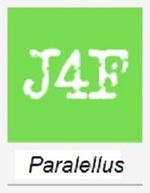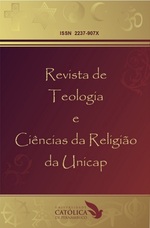MYTHO-PHANY
FROM THEORY TO EXPERIENCE OF MYTHIC CONSCIOUSNESS
DOI:
https://doi.org/10.25247/paralellus.2023.v14n34.p233-253Keywords:
Mythe, sacré, conscience supra-sensible, symbolique, invisible, corpsAbstract
Since its beginnings, cultural anthropology has encountered expressions of mythical thought in traditional societies or primitive peoples, especially non-European ones. Interpretations of this cultural imaginary vary between the hypothesis of a specific form of archaic thought, deconstructed and overtaken by rational thought, of European origin, and a structuralist explanation, based on universal cognitive structures, as in Claude Lévi Strauss, for example, who minimizes the break between wild and scientific thought, but refers them to abstract formalisms, emptied of their affects and existential content. A more phenomenological and existential approach to the mythical imaginary, in a sense extended to all beliefs, including monotheistic ones, would enable us to better understand how mythic narration is rooted in an experience of symbolic consciousness, endowed with its affective structures and its narrative, semantic and syntactic constraints. Based on the work of Walter Otto, Ernst Cassirer, Mircea Eliade, Gilbert Durand, Georges Gusdorf, Kurt Hubner, Henry Corbin, Paul Ricœur, James Hillman and others, mythic consciousness emerges as a form of being-in-the-world, an existential dimension of imaginative consciousness. It constitutes a genuine alternative and complement to the rational view of the objective world, which cannot be the only way of representing life, actions and institutions.
Downloads
References
BACHELARD, Gaston, 1989 [1950], La dialectique de la durée, Paris, Quadrige, PUF
BENVENISTE Emile, 1969, Le vocabulaire des institutions indo-européennes, Paris Ed. de minuit, tomes I et II
CAILLOIS Roger, 1970, L'homme et le sacré , Paris, Gallimard, Idées, 1970
CASSIRER, Ernst, 1972, La philosophie des formes symboliques, Tome 2 : la pensée mythique, Paris, Editions de minuit
CORBIN Henry, 1958, L'imagination créatrice dans le soufisme d'Ibn Arabi, Paris, Flammarion
COULOUBARITSIS Lambros, 2009, La pensée de Parménide, Bruxelles, Ousia
DESCOLA Philippe, 2005, Par delà nature et culture, Paris, Gallimard
DURAND Gilbert, [1960] 1992, Les structures anthropologiques de l'imaginaire, 12eme ed., Paris, Dunod
ELIADE, Mircea, 1966 [1963], Aspects du mythe, Paris, Idées, Gallimard
GUSDORF, Georges, 1953, Mythe et métaphysique, Paris, Flammarion
HUBNER Karl, 1990, "La recherche sur le mythe : une révolution encore méconnue" in , Paris, Krisis, N°6, octobre 1990
JOUSSE Marcel, 2008 [1974], Anthropologie du geste, Paris, TEL, Gallimard
KANTOROVICZ Ernst Hartwig, 1989, Les deux corps du roi, Paris, Gallimard
LEVI-STRAUSS Claude, 1962, La pensée sauvage, Paris, Plon
LEVI-STRAUSS Claude, 1971, "Entretien", in Magazine littéraire, Paris, novembre 1971, N° 58
MERLEAU-PONTY Maurice, 1976 [1964], Phénoménologie de la perception, Paris, TEL, Gallimard
OTTO, F, W., 1987, Essais sur le mythe, TER- Trans europ reprint
SERVIER Jean, 1980, L'homme et l'invisible, Paris, Imago Petite bibliothèque Payot
SCHWALLER DE LUBICZ, 1982, Le roi de la théocratie pharaonique, Paris, Champs, Flammarion
SOREL Raynal, 2000, Critique de la raison mythologique, fragments d'une discursivité mythique, Paris, PUF
TARDE Gabriel, 1897, La répétition universelle, Paris, Alcan, 1897
TROUILLARD Jean, 1977, "Les fondements du mythe selon Proclos" in Le mythe et le symbole, Philosophie, N°2, Institut catholique de Paris, Beauchesne
VARAGNAC André, 1948, Civilisation traditionnelle et genres de vie, Paris, Albin Michel, 1948,
WUNENBURGER Jean-Jacques, (2002a), Une utopie de la raison, Paris, La table ronde
WUNENBURGER Jean-Jacques, 2002b, La vie des images, Grenoble, Presses universitaires de Grenoble
ZAFIROPOULOS, Markos, BOCCARA Michel, 2004, Le mythe : pratiques, récits, théories, Paris, ed. Anthropos, Economica
Downloads
Published
Issue
Section
License
Copyright (c) 2023 Jean-Jacques Wunenburger

This work is licensed under a Creative Commons Attribution 4.0 International License.
A submissão de originais para a Paralellus implica a transferência, pelos autores, dos direitos de publicação eletrônica. Os direitos autorais para os artigos veiculados neste periódico são do autor; todavia, são da revista os direitos sobre a primeira publicação. Os autores somente poderão fazer uso dos mesmos resultados em outras publicações se indicarem, claramente, que a Paralellus foi o meio originalmente utilizado. Em decorrência do fato de ser a Paralellus uma revista de acesso público, é permitida a utilização gratuita dos artigos em aplicações educacionais e/ou científicas não comerciais, desde que respeitando-se a exigência de citação da fonte (Texto atualizado em 16-11-2020).
















